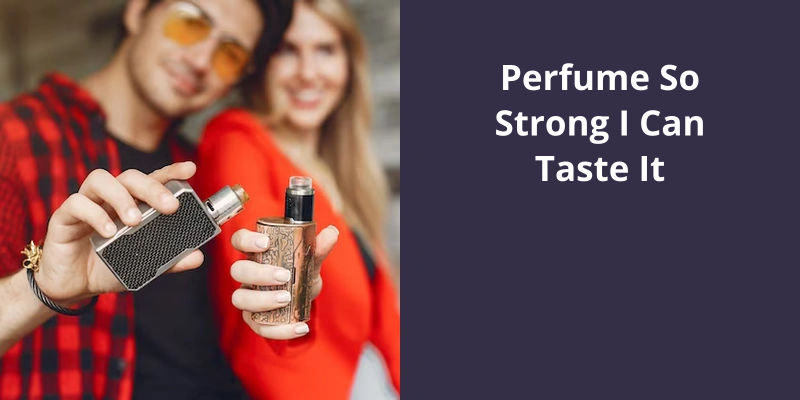The phrase “Perfume so strong I can taste it” is a subjective description often used to express that someone’s perfume or cologne is overly powerful or concentrated. This can happen when a person applies too much fragrance or uses a scent with very heavy or persistent notes. Not only can heavy fragrances be smelt from a distance, but they can also create a taste in the mouth because our senses of smell and taste are closely linked; hence, a strong smell can trigger the perception of taste. This is usually not a pleasing sensation and could lead to discomfort, coughing, or even headaches. To prevent this, it is recommended to use fragrances sparingly and opt for lighter, less overpowering scents.

Is My Perfume Too Strong if I Can Smell It?
It’s essential to keep in mind that your olfactory system can become desensitized to odors after prolonged exposure. This means that although you might not be able to smell your perfume anymore, others around you can. Therefore, it’s crucial to check in with someone else to see if your fragrance is too overpowering. It’s always better to err on the side of caution because too much perfume can be distracting and even offensive to others in close proximity.
If youre unsure about the strength of your scent, it’s best to opt for a lighter and more subtle fragrance. Not only will it be easier on the senses, but it will also provide you with a more understated and elegant aura. Remember that less is more when it comes to perfume. Instead of dousing yourself in your favorite fragrance, try a light spritz on your pulse points, such as your wrists, behind your ears, and the base of your neck.
How to Properly Apply Perfume for the Perfect Intensity.
To get the perfect intensity when applying perfume, it’s important to spritz it on your pulse points such as the wrists, neck, and behind the ears. Don’t rub the perfume after application, as it can change the scent’s composition and intensity. And remember to apply it sparingly – less is more when it comes to perfume.
Now that we know how to apply perfume without it being too overpowering, let’s explore some other ways to make sure our scent stays subtle yet present throughout the day.
How Do You Put on Perfume Without It Smelling Too Strong?
Another tip is to apply perfume directly after showering or bathing, while your skin is still slightly damp. This will help the perfume to absorb into your skin more evenly and create a softer scent. Additionally, consider using a less concentrated perfume or opting for a body mist to create a lighter fragrance.
If you find that your perfume is still too strong, try applying it to your clothing instead of directly onto your skin. This will help to dilute the scent and create a more subtle fragrance. Just be sure to test a small area first to ensure that the perfume won’t stain or damage the fabric.
Another way to control the strength of your perfume is to layer it with unscented moisturizer. Simply apply a small amount of perfume to your wrists and neck, and then follow up with a layer of moisturizer to help dilute the scent. This will also help the scent to last longer on your skin.
Finally, when it comes to choosing a perfume, opt for one with softer, lighter notes instead of heavier, more intense scents. Floral and citrus scents are great options, as they tend to be more subtle and refreshing. By following these tips, you can enjoy the perfect amount of fragrance without overwhelming yourself or those around you.
How to Choose the Right Perfume for Your Body Chemistry
Choosing the right perfume for your body chemistry involves taking into consideration your skin type and natural scent. It’s important to test perfumes on your skin and allow them to settle before making a purchase. Additionally, understanding fragrance notes and how they interact with your body chemistry can help you find a perfume that complements your natural scent.
While perfume is designed to enhance our senses and evoke emotions, it’s important to remember that it contains potentially toxic substances. As such, it’s crucial to exercise caution and avoid ingesting it, as it can cause harm to our bodies. In this article, we’ll explore the question of whether it’s safe to taste perfume and delve into the potential health risks associated with doing so.
Is It Safe to Taste Perfume?
Knowing this, it should be clear that tasting perfume isn’t safe. While the common advice is to avoid ingesting perfume, some individuals may wonder if a small amount of perfume will cause harm. The answer isn’t straightforward.
Some ingredients in perfume can be irritating to the skin, eyes, and lungs. If a small amount of perfume is ingested, it may trigger symptoms such as nausea, vomiting, abdominal pain, dizziness, or headache. Some individuals may also experience respiratory distress if they inhale perfume particles, especially those with asthma or allergies. Moreover, some perfumes contain toxic substances such as phthalates, which can accumulate in the body over time and cause adverse effects, including reproductive harm.
Young children and pets are particularly susceptible to the harmful effects of perfume ingestion. They may be attracted to the fresh and fruity scents and accidentally drink from perfume bottles. Therefore, it’s crucial to keep perfume out of reach of children and pets and store it in a cool, dry place away from direct sunlight.
If you accidentally swallow perfume or have symptoms after tasting perfume, seek medical attention immediately. Don’t induce vomiting unless instructed by a healthcare provider. If the perfume comes in contact with skin or eyes, rinse them thoroughly with water and seek medical attention as needed. Additionally, if you’ve a history of allergies or asthma, consult with your healthcare provider before using any scented products, including perfume.
To stay safe, avoid ingesting perfume, keep it out of reach of children and pets, and seek medical attention if needed.
Source: I’d a tiny bit of perfume in my mouth, can you get brain …
Finding the perfect perfume that suits your personality and skin can be a challenging task. However, with a little bit of research and knowing your preferences, it can be a fun and exciting experience. One of the most important steps to finding the right perfume is testing the fragrance on your skin. This helps to determine how the scent reacts with your body’s chemistry and if it complements your skin’s natural aroma. Keep reading to discover more factors to consider when selecting the perfect perfume.
How Do I Find the Right Perfume for My Skin?
When choosing a perfume, it’s important to take into consideration the type of scent you prefer. Do you like floral scents, woody notes, or perhaps a mix of both?
Another factor to consider is the occasion. Do you want a daytime perfume or a more sophisticated scent for an evening out? Daytime fragrances are usually lighter and fresher, while evening fragrances are heavier and more intense.
It’s also essential to take into consideration the climate and season. Hotter seasons call for lighter perfumes, while wintertime may call for something richer and warmer.
Taking a look at the notes and ingredients of the perfume may also be helpful in determining if it’s a good fit for your skin. Some people may have allergies or sensitivities to certain ingredients, while others may prefer a natural perfume that doesn’t contain harsh chemicals.
Lastly, don’t be afraid to ask for recommendations from a trusted friend or salesperson at a perfume shop. They’ve experience in choosing the right fragrance for different skin types and preferences and will be able to guide you in the right direction. Overall, finding the right perfume takes time and experimentation, but once you find the perfect match, it can become a signature scent that brings joy every time it’s worn.
Your brain then combines these senses to create a perception of taste and smell, which can explain why you can taste perfume after spraying it. However, there’s more to this phenomenon than simply breathing in the air. Keep reading to discover the science behind this interesting experience.
Why Can I Taste Perfume After Spraying It?
Have you ever sprayed perfume or cologne on your clothes or body and then, within a few minutes, noticed that you could taste it as well? This is a strange phenomenon that many people have experienced, but it isn’t a coincidence. The reason why you can taste perfume after spraying it’s rooted in the anatomy of our olfactory system.
Our sense of taste and smell are connected in ways that are still being studied by scientists, but we do know that when we smell something, we’re actually detecting tiny molecules in the air that have evaporated from a substance. When we inhale these molecules, they travel past our olfactory receptors in the nose and into our brain, where they’re processed into the sensation of scent.
However, when we spray perfume or cologne on our bodies, some of these molecules also end up in our mouths as we breathe in. This is because the nose and mouth are connected by a pathway known as the nasopharynx, which allows air to travel between the two areas. As we inhale the scents from the perfume, they can travel through the nasopharynx and reach the back of the mouth, where they can be tasted.
This connection between smell and taste is a powerful one, and it can enhance our experience of certain foods and drinks. For example, a glass of red wine may taste even better when we can smell the aromas of it’s bouquet as we sip it. Similarly, a dish of fragrant herbs and spices can be even more delicious when we can also taste the flavors in the air as we eat it.
But when it comes to perfume, tasting it can be an unwanted side effect. It can even be dangerous if the perfume contains toxic substances that aren’t meant to be ingested. In order to avoid tasting your perfume, it’s best to spray it at a safe distance from your face and to avoid spraying it directly onto your skin or clothes as much as possible.
Whether we’re enjoying the aromas of our favorite foods and drinks or trying to avoid tasting perfume, our olfactory system plays a crucial role in our daily experiences.
How to Choose the Right Perfume for Different Occasions and Personalities
- Consider the occasion – Is it a casual event or a formal one? For formal events, choose a perfume that’s elegant and sophisticated. For casual events, choose a perfume that’s light and fresh.
- Take your personality into account – Do you prefer bold and daring scents or soft and subtle ones? Choose a perfume that reflects your personality.
- Think about the season – Different perfumes work better in different seasons. For example, floral scents are great for spring and summer, while musky scents are better suited for fall and winter.
- Test the perfume before buying – Always try the perfume on your skin before making a purchase. Perfumes can smell different on different people, so it’s important to see how it interacts with your body chemistry.
- Consider the longevity – How long do you want the scent to last? Some perfumes have staying power and can last all day, while others may only last a few hours.
- Take note of the notes – Perfumes are composed of different notes, including top notes, middle notes, and base notes. Make sure you like all the notes in the perfume before making a purchase.
- Consider other factors – Are you allergic to any ingredients in perfumes? Do you prefer all-natural or organic products? Take these factors into consideration when choosing a perfume.
While perfume is generally a safe and enjoyable product for most people, accidental ingestion can have serious consequences. In this article, we will discuss the potential dangers of getting perfume in your throat and what steps to take if it does occur. From understanding the symptoms of cologne poisoning to seeking medical attention, it’s important to be informed and prepared in case of an emergency.
What Happens if You Get Perfume in Your Throat?
Inhaling perfume or cologne can also cause damage to the lungs, particularly if it’s concentrated and is inhaled directly. When perfume is inhaled, it can irritate the respiratory tract, causing inflammation and sometimes leading to coughing fits.
Perfume manufacturers may use a variety of synthetic fragrances and chemicals, many of which haven’t been tested for toxicity. Additionally, these synthetics can cause skin irritation and other allergic reactions. If youre experiencing symptoms like itching, burning, or swelling after having applied perfume topically, discontinue use and seek medical attention if symptoms worsen.
As with any beauty or personal care product, it’s essential to be aware of the potential risks and use products in moderation to avoid over-exposure.
-Symptoms of Perfume Allergy
Perfume allergy symptoms include sneezing, itching, redness, swelling, and difficulty breathing. These symptoms can occur immediately or after a few hours of exposure to perfume.
Conclusion
The sensation of a scent lingering in your throat can sometimes trigger feelings of nausea. And while hyperosmia is a rare condition that can cause this experience, it can be challenging to diagnose, as it often relies on subjective reporting. Despite the challenges, understanding the mind-body connection between scent and taste can shed light on our perception of the world around us and how it impacts our wellbeing.





